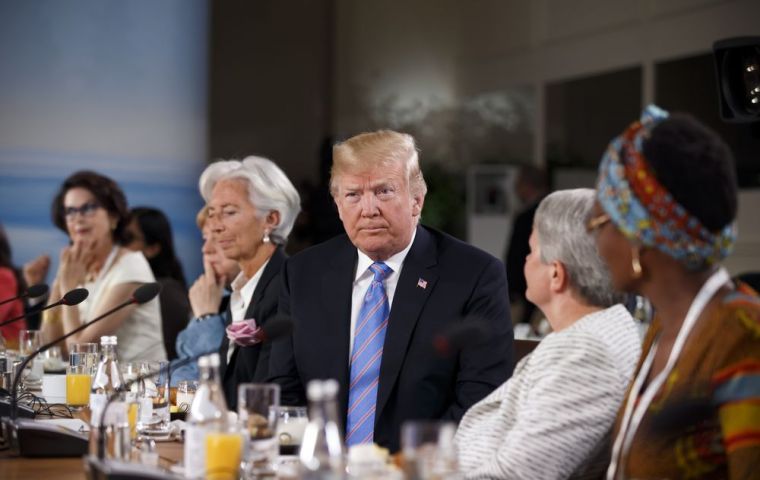MercoPress. South Atlantic News Agency
IMF contradicts Trump: US companies and consumers are paying for the higher tariffs on Chinese imports
 The researchers found “tariff revenue collected has been borne almost entirely by US importers”, according to the IMF's blog post released last week.
The researchers found “tariff revenue collected has been borne almost entirely by US importers”, according to the IMF's blog post released last week.  The report concludes what most private economists have argued for months: that China doesn't pay US tariffs, American consumers and companies do.
The report concludes what most private economists have argued for months: that China doesn't pay US tariffs, American consumers and companies do. Companies in the United States are paying almost all the costs from tariffs on Chinese imports, International Monetary Fund (IMF) researchers said in findings that contradict US President Donald Trump's assertions that China is footing the bill.
The researchers found “tariff revenue collected has been borne almost entirely by US importers”, according to the IMF's blog post released last week.
“Some of these tariffs have been passed on to US consumers, like those on washing machines, while others have been absorbed by importing firms through lower profit margins.”
The report concludes what most private economists have argued for months: that China doesn't pay US tariffs, American consumers and companies do.
“Consumers in the US and China are unequivocally the losers from trade tensions,” the IMF paper said.
It is rare for the IMF to disagree with its largest shareholder, and the paper was released just as the rhetoric in Mr Trump's trade war with China reaches a boiling point.
“For 10 months, China has been paying Tariffs to the USA of 25% on 50 Billion Dollars of High Tech, and 10% on 200 Billion Dollars of other goods,” Mr. Trump tweeted on May 5.
Trade talks between Beijing and Washington stalled this month as Trump accused China of backing out of a deal that was taking shape.
In response, Trump increased levies on US$ 200 billion in Chinese imports to 25% from 10%, prompting retaliation from Beijing.
According to a separate report from researchers at the Federal Reserve Bank of New York, the US' 15 percentage point increase in tariffs will result in an annual cost of US$831 per American household, about double the bill on Trump's 2018 tariffs.
The US has also released a list of about US$ b300bn in Chinese goods that could face additional tariffs including clothing, toys and mobile phones. Those levies, if imposed, would cover essentially all Chinese imports and hit a broader swathe of American households.
Earlier this month, White House economic director Larry Kudlow acknowledged “both sides will suffer” from the widening US-China trade war, while predicting that the impact on US jobs and growth from higher tariffs on Chinese goods would be “de minimis”.
China later blamed Washington for wrecking the talks and insisted the US must alter its “wrong practices” before negotiations can resume.
Financial markets, meanwhile, are slumping amid prospects for a long dispute between the world's two largest economies.
Co-written by IMF chief economist Gita Gopinath, the paper says a trade war that escalates with all the threatened tariffs will subtract about a third of a percentage point from global gross domestic product, “with half stemming from business and market confidence effects”.
“This type of scenario is among the reasons why we referred to 2019 as a delicate year for the global economy,” the IMF economists wrote.
In April, the fund cut its 2019 forecast for global growth to 3.3%, the lowest since the financial crisis, citing higher tariffs weighing on trade and weakness in some advanced economies.




Top Comments
Disclaimer & comment rules-

Read all commentsREF: “consumers are paying for the higher tariffs”:
May 29th, 2019 - 02:56 pm 0#1: Who is forced into importing from China?
#2: If the masses afford to pay more; what's wrong?
Commenting for this story is now closed.
If you have a Facebook account, become a fan and comment on our Facebook Page!